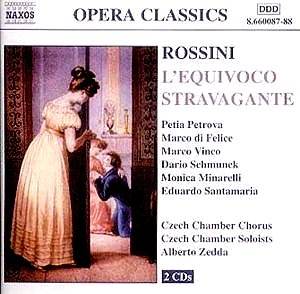L'Equivoco Stravagante is Rossini's third opera, preceded
only by Demetrio e Polibio (1808) and La Cambiale di Matrimonio
(1810). It had its first performance on 26 October 1811. The opera
was taken off after its third performance and, apparently, went unrevived
until an edition by Vito Frazzi was produced in Siena in 1965. The Italian
radio aired a performance in 1974 and now Naxos have issued a recording
compiled from two performances at the 2001 Rossini in Wildbad Festival
in a new critical edition by Marco Beghelli and Stefano Piana.
The opera's early demise cannot be attributed to the
quality of Rossini's invention. It was the libretto which caused offence,
centred as it is on the device of a woman pretending to be a castrated
male pretending to be a woman. This, in 1811 when the subject of male
mutilation for musical ends was a very, well, touchy issue! Too much
so for the local censor who objected as well to the numerous doubles
entendres and leering innuendos scattered throughout the text. Non-Italian
speakers will have to take most of this on faith as Naxos, whilst commendably
including a complete Italian libretto with the set, have neglected to
provide an English, or any other, translation. There is, however, a
fairly detailed synopsis cued to the musical numbers.
Though Naxos proclaim theirs a "World Premiere" recording,
in fact both of the previous productions I mentioned were issued on
disc, the Siena performance as one of Edward J Smith's "Golden Age of
Opera" LP sets (EJS 348) and the RAI relay on the Bongiovanni "Golden
Age of Opera" CD label (GAO 154). As the former included amongst its
cast Margherita Rinaldi and Pietro Bottazzo and the latter included
Margherita Guglielmi, Rolando Panerai, and Sesto Bruscantini, it can
be claimed that they are by no means wholly superseded by the new issue.
Still, on several scores the Naxos is to be preferred even apart from
the fact that it alone of the three editions is readily available.
As the notes inform us, Rossini, never one to waste
a good tune, several times raided the score of this opera to add to
newer works. So experienced Rossinians will experience several instances,
beginning with the overture, of déja entendu. In fact
the first few numbers, while attractive enough, are conventional in
matter and manner. Then the first major ensemble appears and everybody
- composer, artists and (as can be deduced from their reaction at its
conclusion), the audience - wakes up; from there to the end it's an
exhilarating ride and, on the whole, a well executed one.
The vocal standout is undoubtedly the young Bulgarian
mezzo-soprano Petia Petrova in the principal female role. She is yet
another of those "Rossini mezzos," seemingly able to field the composer's
most fiendishly dazzling ornaments with ease. She runs up and down and
all around the scales with dizzying facility and contributes lively
characterisation in the midst of it all. Most impressive.
Her tenor, Dario Schmunck, has a very pretty voice
which he uses quite well. There is just a hint now and then of insecurity
at the top of his range to spoil his achievement.
Marco di Felice sings the demanding principal baritone
role with technical aplomb and a lively sense of character. The others
are all more than adequate in their parts.
It is an irony of today's opera world that even major
theatres have the devil's own time trying adequately to cast an Aida
or Gioconda but there seems to be no lack of young artists, as
here, who though not world-famous names, can sing difficult Rossini
scores as though to the manner born.
An important support of their efforts surely comes
from having the experienced Rossini specialist Alberto Zedda at the
conductor's desk. He gets his soloists to run with the reckless Rossinian
ensembles, but never at a cost to proper singing. There is little of
the vocal mugging that used to be such an inescapable feature (and trial)
of "funny" roles in Rossini opera.
So, in fine, it must be said again, as so often, that
Naxos have come up with a real winner. At the price, an irresistible
bargain for all lovers of Rossini's genius.
Calvin M Goodwin


